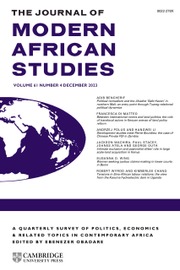-
- Get access
- Contains open access
- ISSN: 0022-278X (Print), 1469-7777 (Online)
- Editors: Corentin Cohen University of Oxford, UK, and Michael Odijie University of Oxford, UK
- Editorial board
Latest content
- Article
-
The roots of political transformation in Ethiopia: a review essay - ‘Ethiopia’s Developmental State: Political Order and Distributive Crisis’, by Tom Lavers, Cambridge University Press, 2023, 116.71 EUR (Hb), pp. xvi+359, ISBN: 9781009428316 - ‘The Abiy Project: God, Power, and War in the New Ethiopia’, by Tom Gardner, Hurst, 2024, 30£ (Hb), pp. 368, ISBN: 9781911723103 - ‘Greater Tigray and the Mysterious Magnetism of Ethiopia’, by Haggai Erlich, Hurst, 2023, 45£ (Hb), pp. 232, ISBN: 9781805260233
- The Journal of Modern African Studies, Volume 63, Issue 4
Featured content
Area Studies « Cambridge Core Blog

-
Do You Know Your South?: How Magazine Readers Shaped one of the South’s Most Successful Novels
- 24 February 2026,
- Midway through Chester Himes’s 1945 novel If He Hollers Let Him Go, the main characters argue over the comparative merits of Richard Wright’s Native Son and...

-
Framing Corruption: The Discourse in Operation Lava Jato and the Judicial Activism in Brazil
- 04 February 2026,
- For years, Operation Lava Jato (Operation Car Wash) was the “spectacle” of Latin American politics. From 2014 to 2021, the world watched as a group...

-
Re-imagining Landscapes through Indigenous Literature
- 12 December 2025,
- “Maize Landscapes in Indigenous Literatures: Toward Alternative Cartographic Imaginaries” discusses the work of four 21st century poets who write bilingually...
History & Classics - Fifteen Eighty Four | Cambridge University Press
-
The State of Nature: Historical Fable, Haunting Future
- 27 February 2026,
- If the last year of geopolitical upheaval has taught us anything, it is that the international order is far more fragile than we cared to imagine. When established The post The State of Nature: Historical Fable, Haunting Future first appeared on Fifteen Eighty Four | Cambridge University Press....

Facebook - History
Twitter - History